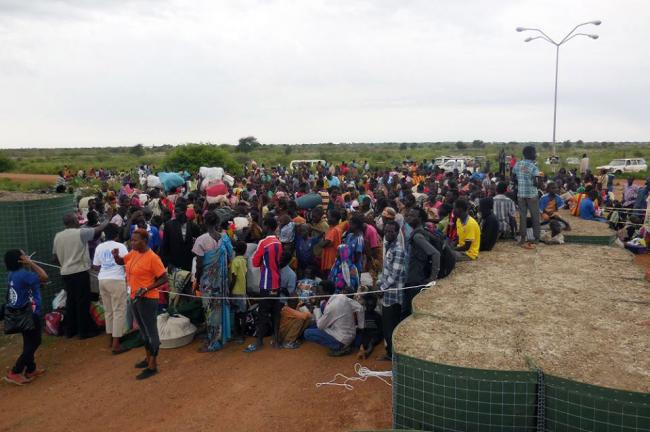
With peace deal set to be signed, South Sudanese parties must address 'drivers of conflict,' Security Council told
“I reiterate my call to the leaders of South Sudan to place the interests of their people above their personal ambitions and to implement the peace agreement in good faith,” said Ellen Margrethe Løj, the head of the UN Mission in the country (UNMISS) in abriefing to the Security Council.
At the same time, she warned that fighting in the Greater Upper Nile region has remained intense and further escalation of hostilities in southern Unity state has had increasingly severe consequences for the civilian population.
Major offensives conducted by the Sudan People’s Liberation Movement/Army in Opposition and its allied militias into opposition-held areas have led to further deterioration of the security and humanitarian situations since April, and resulted in numerous reports of grave human rights violations. “Most recently, on 19 August, fighting occurred between SPLA [Sudan People’s Liberation Army] and Opposition forces around Leer town, with both sides trading accusations of having initiated the attack,” Løj added.
Explaining that both sides have stayed in close proximity to each other along the banks of the Nile River, she said that she was disappointed that they have not observed the Cessation of Hostilities or the ceasefire that they agreed to in Addis Ababa.
The escalation of fighting has sparked further displacements, said Løj, who is also the Special Representative of the Secretary-General for the country. “Civilians from conflict-affected counties in southern Unity state have fled to the UNMISS protection of civilians site in Bentiu, while new internally displaced persons (IDPs) from the west bank of the Nile arrived at the Mission’s base in Malakal.”
The overall humanitarian situation continues sharply to deteriorate, explained Under-Secretary-General to Humanitarian Affairs Stephen O’Brien to Council Members. “As of today, over 2.2 million people have been displaced due to the conflict, an increase of 200,000 since the beginning of this year. Over 1.6 million are displaced internally and over 616,000 people have fled to neighboring states. And severe food insecurity is affecting 4.6 million people this year compared to 3.8 million at the height of the lean season last year.”
UNMISS is now providing protection to over two hundred thousand IDPs at six protection of civilians sites, underlined Special Representative Løj. “The Bentiu site has experienced the largest recent increase in IDPs, up by 140 per cent since late April, while the population at the Malakal site has grown by almost 50 per cent just since mid-July,” she noted.
The large influx of IDP’s into UNMISS bases during the reporting period, and the resulting rise in political, ethnic and tribal tensions, as well as criminal activity in the camps, underscores the “unsustainability” of these protection sites for the longer term, she stressed.
The Mission, Løj said, has further expanded its reach outside of these sites, through patrols, in order to increase security for the local populace, while also facilitating conditions for the delivery of humanitarian assistance. “However, capacity and resource constraints and deliberate obstruction by the parties have limited these efforts,” she regretted.
“The scope and level of cruelty that has characterized the attacks against civilians suggests a depth of antipathy that goes beyond political differences. Allegations include rampant killing, rape, abduction, looting, arson and forced displacement and even such horrific acts as burning of people inside their own homes,” said O’Brien, who assured the Council there is evidence of “deliberate ethnic targeting” of and reprisals against women and girls, hundreds of them having been have been abducted and hundreds more subjected to sexual violence, including gang-rape, in Unity state.
Against that background, international and regional partners, following the partial signing of the so-called Intergovernmental Authority on Development (IGAD) Plus peace agreement on 17 August, urged South Sudanese President Salva Kiir to sign the accord by the end of the 15-day deadline he requested and called on all parties to immediately cease all hostilities. Upon his return from Addis Ababa, the President began intensive consultations that led to the announcement of signing the agreement tomorrow, on Wednesday.
“I reiterate my call to the leaders of South Sudan to…implement the peace agreement in good faith. While [the UN Mission] will do all possible to support implementation, I must remind this Council that, albeit very important, this agreement is only a first step. Peace, stability and prosperity will not come to South Sudan overnight. This process will require concerted and sustained effort from both national stakeholders and international partners,” said Løj.
Focus, she added, will also need to be drawn to the range of intercommunal and other conflicts, which in some states, prove to be just “as violent as the political struggle.” “We must devise ways to support the South Sudanese people to address the drivers of conflict as we lay the foundation for longer-term peace and development,” the UNMISS chief concluded.
Photo: UNMISS
Support Our Journalism
We cannot do without you.. your contribution supports unbiased journalism
IBNS is not driven by any ism- not wokeism, not racism, not skewed secularism, not hyper right-wing or left liberal ideals, nor by any hardline religious beliefs or hyper nationalism. We want to serve you good old objective news, as they are. We do not judge or preach. We let people decide for themselves. We only try to present factual and well-sourced news.







